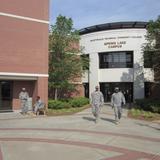- The mission of Sandhills Community College is to provide educational programs of the highest quality to all the people of Sandhills.
School Highlights
Sandhills Community College serves 4,786 students (26% of students are full-time).
The college's student:teacher ratio of 11:1 is lower than the state community college average of 13:1.
Minority enrollment is 47% of the student body (majority Black and Hispanic), which is less than the state average of 48%.
Quick Stats (2025)
- Enrollment: 4,786 students
- In-state tuition: $2,385
- Out-state tuition: $8,529
- Student:teacher ratio: 11:1
- Minority enrollment: 47%
- Source: Integrated Postsecondary Education Data System (IPEDS)
School Overview
The teacher population of 447 teachers has stayed relatively flat over five years.
Sandhills Community College
(NC) Community College Avg.
Carnegie Classification
Associate's Colleges: Mixed Transfer/Career & Technical-High Traditional
Associate's Colleges: Mixed Transfer/Career & Technical-High Nontraditional
Institution Level
At least 2 but less than 4 years
At least 2 but less than 4 years
Institution Control
Public
Public
Total Faculty
447 staff
256 staff
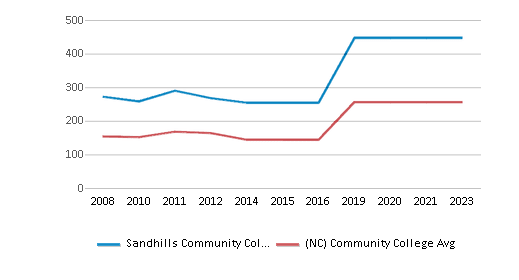
School Calendar
Student Body
The student population of Sandhills Community College has grown by 18% over five years.
The student:teacher ratio of 11:1 has increased from 9:1 over five years.
The Sandhills Community College diversity score of 0.67 is more than the state average of 0.66. The school's diversity has stayed relatively flat over five years.
Total Enrollment
4,786 students
2,542 students
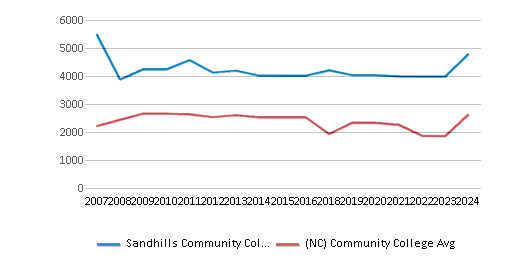
Student : Teacher Ratio
11:1
13:1
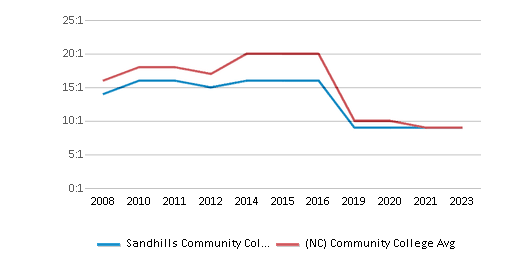
# Full-Time Students
1,259 students
766 students
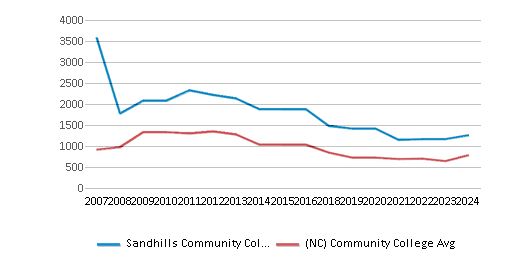
# Part-Time Students
3,527 students
1,813 students
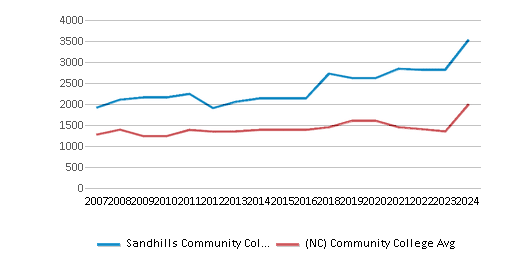
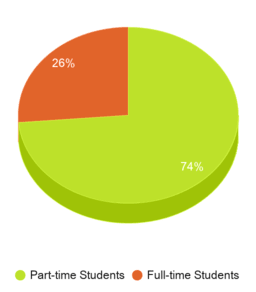
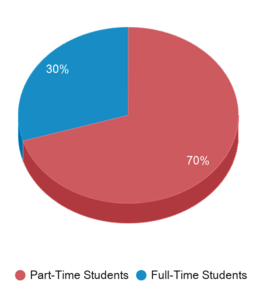
# Enrollment Undergraduate
478 students
316 students
# Full-Time Undergraduate Students
1,259 students
766 students
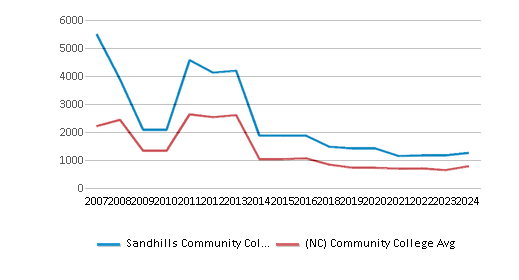
# Full-Time Graduate Students
n/a
22 students
# Part-Time Undergraduate Students
3,527 students
1,990 students
# Part-Time Graduate Students
n/a
3 students
Total Dormitory Capacity
n/a
717 students
% American Indian/Alaskan
3%
1%
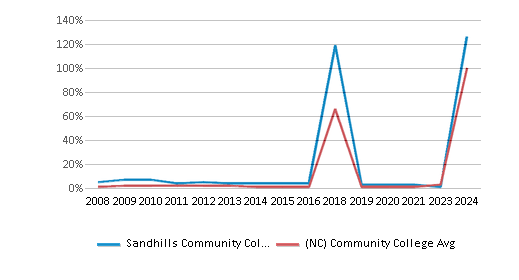
% Asian
1%
3%
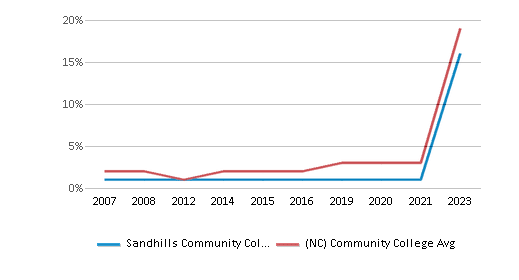
% Hispanic
14%
13%
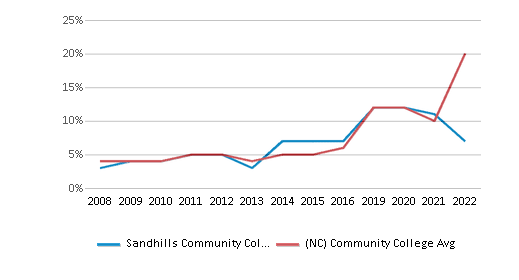
% Black
16%
21%
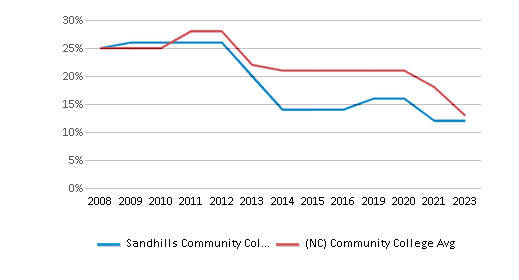
% White
53%
52%
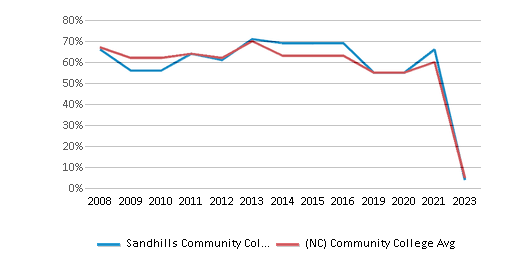
% Hawaiian
n/a
1%
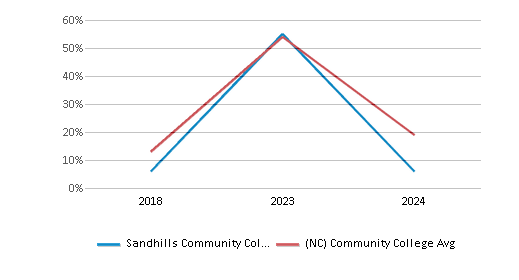
% Two or more races
5%
3%
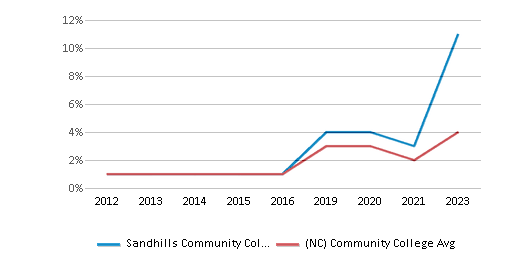
% Non Resident races
n/a
1%
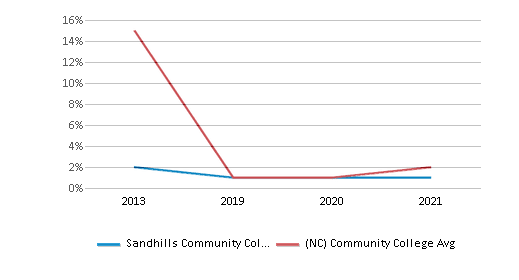
% Unknown races
9%
5%
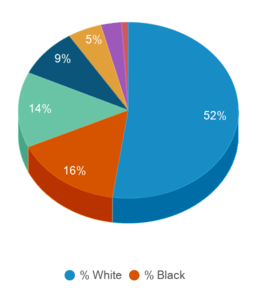
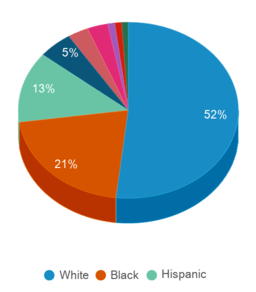
Diversity Score
0.67
0.66
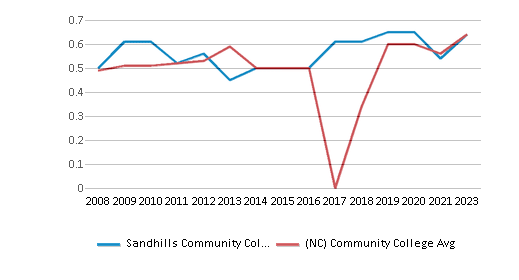
College Completion Rate (Students who graduate in less than 4 years)
0.3982%
0.3684%
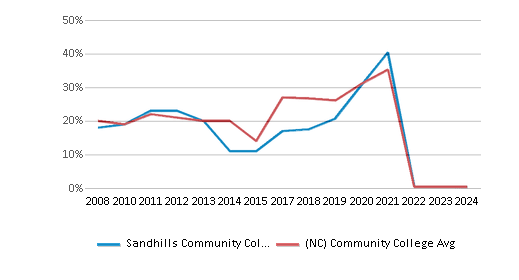
College Completion Rate (Students who graduate in 4 years or more than 4 years)
n/a
0.4286%
Average Graduate Earnings (10 Years)
$27,200
$27,500
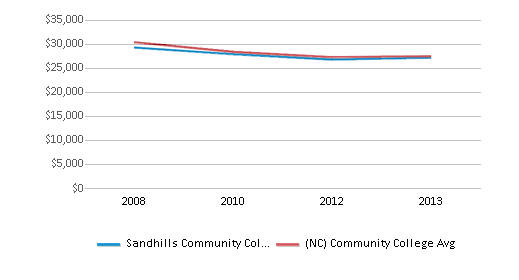
Tuition and Acceptance Rate
The public in-state tuition of $2,385 is less than the state average of $3,915. The in-state tuition has declined by 13% over four years.
The public out-state tuition of $8,529 is less than the state average of $9,508. The out-state tuition has stayed relatively flat over four years.
In-State Tuition Fees
$2,385
$3,915
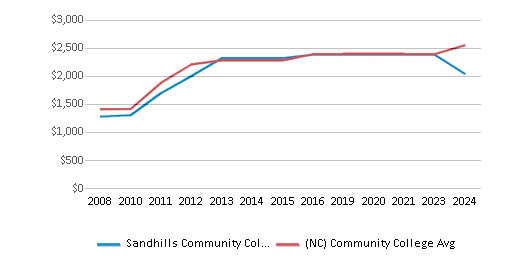
Out-State Tuition Fees
$8,529
$9,508
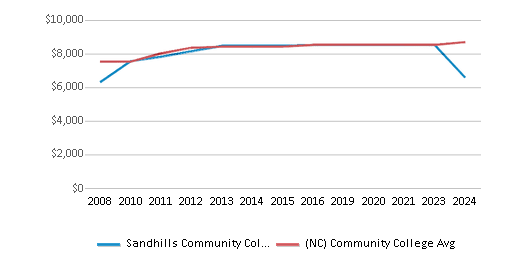
% Students Receiving Some Financial Aid
81%
82%
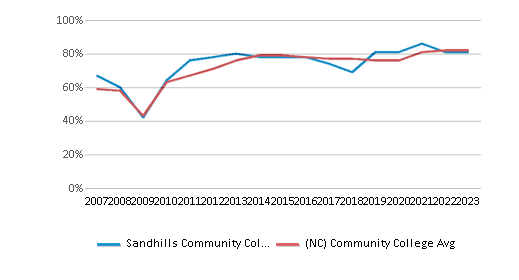
Median Debt for Graduates
n/a
$11,865
Median Debt for Dropouts (Year 2007)
$2,625
$2,625
Acceptance Rate
n/a
82%
SAT Reading
n/a
488
SAT Math
n/a
498
ACT Composite
n/a
20
ACT English
n/a
13
ACT Math
n/a
16
Sports
Total Sports Offered
5 sports
Sports
Basketball, Cross Country, Golf, Track and Field, Volleyball
Source: 2024 (or latest year available) Integrated Postsecondary Education Data System (IPEDS) , School Administrators
School Notes
- Sandhills Community College was established in December 1963 under authority of the 1963 State Community College Act. Following the leadership of Representative H. Clifton Blue, Moore County citizens petitioned the State Board of Education for approval to establish a community college in the county and voted overwhelmingly for a one million dollar bond issue for construction and a tax levy for operation and maintenance of facilities. Before the end of 1963, a board of trustees had been named, an organizational meeting held, an architect selected, and Dr. Raymond Stone chosen as first president of the college. Today, the college is a modern, fourteen-building campus with a new student center and soon-to-be-completed educational technology building. The college's presence and capabilities are also growing at its facility in Hoke County where planning is underway to develop a second building—an education center. The college offers three college transfer degrees (Associate in Arts, Associate in Science, and Associate in Fine Arts) and more than thirty technical programs leading to an associate's degree, diploma or certificate. SCC ranks 10th in the System in students who transfer to four-year colleges and universities in NC. Continuing Education offers classes in areas such as computers, community enrichment, basic skills education (Adult High School, English as a Second Language, GED, etc.), small business, public services (i.e. fire, law enforcement, and rescue), occupational Spanish, and more. Sandhills Community College is accredited by the Commission on Colleges of the Southern Association of Colleges and Schools to award the associate's degree.
Frequently Asked Questions
How much does Sandhills Community College cost?
Sandhills Community College's tuition is approximately $2,385 for In-State students and $8,529 for Out-State students.
What sports does Sandhills Community College offer?
Sandhills Community College offers 5 interscholastic sports: Basketball, Cross Country, Golf, Track and Field and Volleyball.
Recent Articles

Obtaining Your Bachelor's Degree at a Community College
Explore the evolving landscape of community colleges offering bachelor's degrees, addressing affordability, accessibility, and workforce needs.

A to Z of Community College Certificates and Courses
From business and healthcare to technology and skilled trades, the article showcases the breadth of options available to students seeking to enhance their knowledge, develop new skills, or pursue career advancement.

What is a Community College?
This comprehensive guide explains what a community college is, its history, and its role in higher education. It covers the types of programs offered, differences from four-year colleges, benefits of attending, and important considerations for prospective students, providing valuable insights for those exploring educational options.


